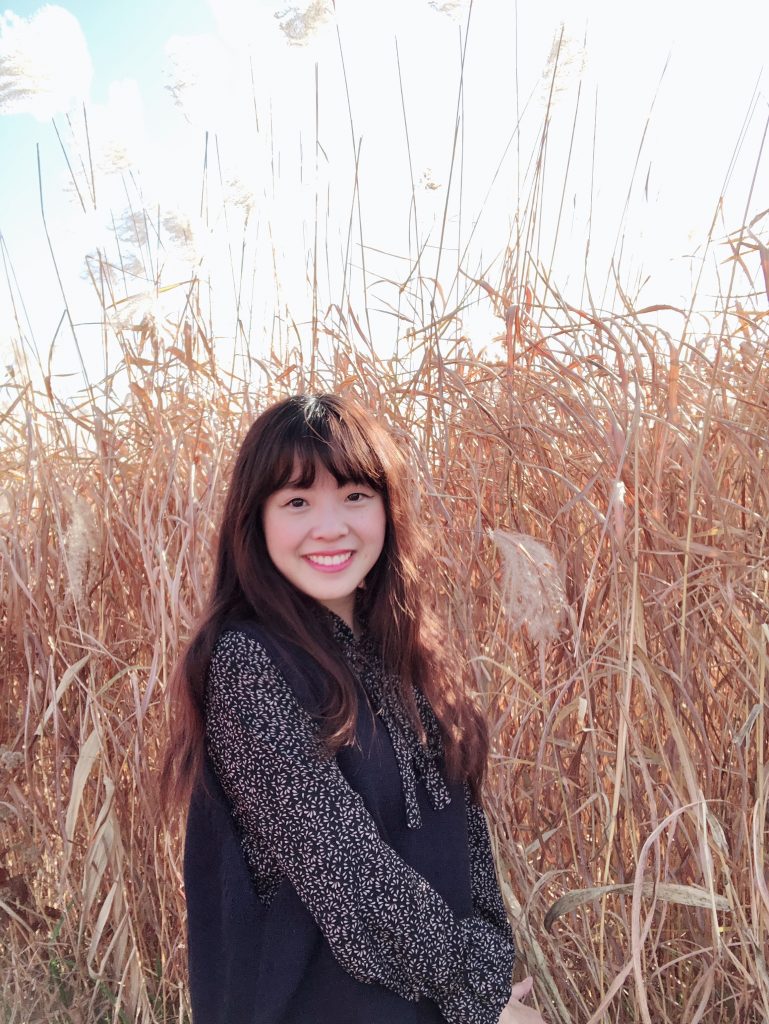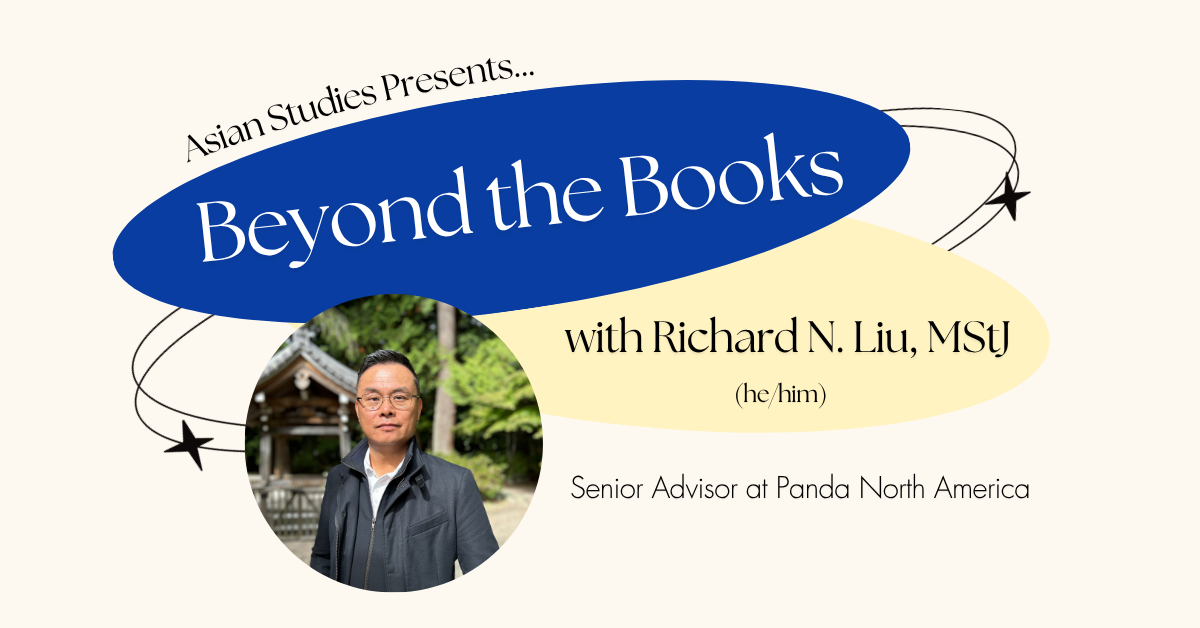Interested in pursuing a BA in Asian Studies? In this interview series, we ask our students about their experience in our program and their future academic and professional goals. This interview features MA student Nicole Lin, who completed her BA at UBC in 2019, double majoring in History and Asian Area Studies. Her MA focus is on Korean Studies: in particular on modern and colonial Korean literature and identity.


Tell us a little about yourself, your background and how you became interested in Asian languages and cultures?
I am currently an MA student in the Department of Asian Studies focussing on Korean Studies under the supervision of Dr. Ross King. I completed my BA at UBC in 2019, double majoring in History and Asian Area Studies.
When I came to UBC as an undergraduate I knew from the outset that I wanted to major in History as I was interested in European history. However, I somehow found myself enrolled in ASIA 101: Introduction to Modern Asia where I was then exposed to a whole other geographic region and history that I had absolutely no idea about. I was so captivated by Korea’s rich culture and history that I ended up taking all the Korea related classes that the department had to offer.
As a Chinese-Canadian who was born and raised in Vancouver I grew up resenting a lot of things about my background and culture. I knew that I was not the type of person that would first come to mind if you thought of a “typical” Canadian yet at the same time I would often hear that I was far too “westernized.” This would eventually manifest itself into a disinterest in all things Asia. However, since becoming an Asian Studies student I’ve realized that the things I’ve been avoiding for most of my life are actually things to be celebrated. Being an Asian Studies student has opened my mind and expanded my horizons both academically and personally in ways that I never could have imagined.
What choice(s) did you make in your undergraduate degree in Asian Studies that lead(s) to your decision in pursuing a MA degree within the same discipline?
I think that one of the best choices I made during my time as an undergraduate was striking up the nerve to have meaningful conversations and interactions with my professors. Like many other students, I am extremely shy when it comes to participating in a class setting but if there was ever a topic addressed in class I wanted to know more about I would take the initiative to send them an email in order to learn more. This actually played a significant part in how I came to work with my supervisor Dr. King. He came as a guest lecturer to one of my classes and I eventually emailed him to ask some additional questions. The exchange lead to an RA position that I held for the last 2 years of my undergraduate degree. And of course, it would eventually lead to him becoming my supervisor in graduate school. Being exposed to manuscripts and other research materials only further encouraged my interest and desire to conduct research of my own. Dr. King is an amazing scholar and his wealth of knowledge was a guiding force in inspiring me to pursue my MA in Korean Studies.
Taking the first step to reach out to your professors can be understandably intimidating but the faculty in our department are generous beyond measure and their commitment to helping students is unparalleled.
Could you explain to a non-expert what you are researching and why it is significant?
My research takes interest in the fact that a great number of Korean writers, most of whom are regarded as significant contributors to the development of modern Korean literature, have simultaneously been branded Japanese collaborators. I wish to examine the intersection at which colonial literature and collaborationist identities converged in order to gain further insight into understandings of empire and its manifestations within the realm of the written word. There are a lot of factors to consider such as the role of censorship and the conflicting identities of ‘imperial citizen’ and ‘colonial subject.’ It is worth contemplating how the literary landscape of this period functioned both as a creative medium and a discursive space in which perceived Japanese collaborators grappled with Korea’s uncertain future. The significance of this topic lies in the fact that it seeks to grapple with the complex realities of human motivations in order to move away from the oversimplified orthodoxy of the patriot-traitor divide.
With that being said though I’ve only just finished my first year in the program so things could change! I think one of the great things about graduate studies is that your research and experiences can lead you to a variety of different interests that would have never otherwise occurred to you.
What are your career and academic goals? And how is our program helping you achieve them?
I am not afraid to admit that I currently do not know what the future holds for me after I finish my MA degree. However, I am confident in the fact that I am acquiring an invaluable skill set that will undoubtedly aid me in whatever I decide to do. One thing in particular I want to highlight is the fact that the Department of Asian Studies has an amazingly diverse language program that has benefited me throughout my years at UBC. I’ve taken Korean from level 100 all the way through to 400 and I’ve been taking Japanese as well. In the future I plan on taking some Cantonese classes too! The language instructors in our department are all incredibly passionate individuals who make language learning as fun and as effective as possible. The language instruction I’ve received here is giving me the necessary tools to further my research, to develop my skills in translation work, and to communicate with those in other parts of the world!
Has there been an aspect of your graduate experience that was unexpected?
One of the most unexpected aspects of my graduate experience so far is the difficulty of settling on a thesis topic. There are so many interesting time periods, figures, and literary works that narrowing the scope of your research project is a difficult one. This is especially true if you are indecisive like me. Furthermore, there is such a wealth of primary and secondary sources both in English and in other foreign languages that you could easily just spend forever reading. Yet as challenging as this is, it is also immensely rewarding as you are continuously learning and fostering your passion.
Can you give any advice to new students in our program or for students considering applying to it?
I think that the most important thing to consider when thinking about graduate school is the motivation behind your decision to go. There are a lot of preconceptions about graduate school in general but at the end of the day the thing that matters most is one’s individual passion and will. There are inevitable hardships that will occur along the way but as long as you see purpose in your work then motivation will come easily. So please be confident and trust that what you are doing is meaningful!


